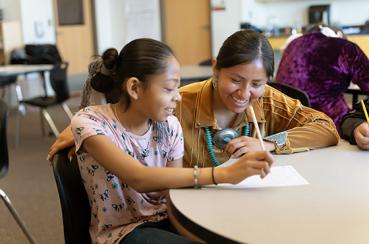Conducting Rigorous Research Related to English Learners │ Center for ELs
AIR contributes to the research base about what works for ELs by conducting rigorous studies focused on teaching and learning. Our experts also evaluate federal, state, and district policies and programming that affect ELs and craft evidence-based recommendations related to these policies and programming.
Research to Improve Teaching and Learning

What Works for Supporting English Learner Students? A Meta-Analysis
This study addresses the need for a comprehensive, systematic review and meta-analysis of EL interventions to consolidate data across the field and better understand what works and under what conditions. Our initial suggests that interventions are effective at increasing English Language Arts and English Language Proficiency, though some outperform others. We are continuing to investigate and further results will be released later in 2023.
A Multisite Randomized Controlled Trial of Descubriendo la Lectura (DLL)
There is a pressing need for Spanish-language early intervention programs for students at risk of literacy failure. One such program is the Spanish-language reconstruction of Reading Recovery known as Descubriendo la Lectura (DLL). DLL offers one-on-one lessons in Spanish for a period of 12‒20 weeks to first-grade Spanish-speaking ELs struggling with reading and writing. The program extends the successful Reading Recovery approach to ELs by first addressing literacy in their native language. Results suggest that DLL produces a clear benefit to students across many dimensions of literacy, and those impacts are consistent across schools and years.
Math and English Language Development for English Language Learners: (Project MELD)
Mastering math and the academic language of math is essential for all students, but especially for ELs who are acquiring content knowledge and English proficiency concurrently. The goal of this three-year study funded by the Institute of Education Sciences was to enable sixth-grade Spanish-speaking ELs to acquire the skills and knowledge they need to meet the new Common Core State Standards for Mathematics (CCSS-M) and Literacy in the Technical Subjects (CCSS-L). The first two years of the study used an iterative development process to refine the intervention, leading to a pilot study in the third and final study year.

Study of Deeper Learning
Several members of the Center for ELs have been involved in the William and Flora Hewlett Foundation’s Study of Deeper Learning. This study is part of the foundation’s effort to promote deeper learning, including learning among the most economically disadvantaged students. The primary purpose of this mixed-methods study is to examine the ways in which schools provide opportunities for deeper learning and the impact these opportunities have on a wide variety of student outcomes, including postsecondary outcomes. Four participating schools—two network schools and two schools outside the networks—serve only EL students, focusing on the education of students who have newly arrived to the country.
Evaluation Research

First 5 California Dual Language Learner Pilot Study
Over 60% of children from birth to age 5 in the state of California are dual language learners (DLLs). The First 5 California-funded Dual Language Learner Pilot Study seeks to identify the range and distribution of learning experiences for DLLs in California and to better understand how these experiences are linked to positive child and family outcomes.Specific goals of the study are to determine what are effective and feasible practices for DLLs in early learning and care settings, across three content areas: instructional practices, professional development, and family engagement; and disseminate findings about best practices to relevant stakeholders and practitioners.
Evaluation of Roosevelt University’s Dual Language Teacher Leadership Program
AIR is evaluating the extent to which teachers who receive a master’s degree in dual language teacher leadership (DLTL) improve the practices and strategies they use to teach English learners. In particular, we will evaluate the graduates of a new DLTL master’s degree program developed by Roosevelt University in Chicago. To do so, AIR has developed a classroom observation protocol designed to capture best practices for teaching English learners in a dual language setting. We will observe program and comparison teachers from the Chicago Public Schools and four suburban Chicago districts before and after the year-long master’s program to determine whether DLTL degree recipients have significantly changed their classroom practices as a result of the program. Tuition waivers for teachers and AIR’s evaluation are funded by a National Professional Development Program grant to Roosevelt University from the Office of English Language Acquisition (OELA) at the U.S. Department of Education.
Evaluation of the Massachusetts Rethinking Equity and Teaching for English Language Learners (RETELL) Initiative
Under this initiative, all core academic teachers in the state are required to complete comprehensive professional development in SEI methods by July 2016. With funding from the Massachusetts Department of Elementary and Secondary Education AIR evaluated the pilot professional development program that was initiated under RETELL.
Study on English Language Learners in Massachusetts
The study funded by the Massachusetts Department of Elementary and Secondary Education capitalizes on Massachusetts’ rich district- and student-level data to provide a profile of ELs in Massachusetts and recommendations for improving their outcomes. The research was organized in two phases. In Phase I, AIR conducted an aggregate district-level analysis of EL student demographic, geographic, and academic program profiles to document key trends across a sample of districts. In Phase II, AIR conducted an in-depth investigation of a kindergarten cohort of ELs to examine students’ academic trajectories over time from initial identification as EL until 10th grade when they may or may not have been reclassified as English proficient.

International Network for Public Schools
With funding from an i3 development grant from the U.S. Department of Education, the Internationals Network for Public Schools implemented its academically rigorous education model for recently arrived immigrant children in two comprehensive high schools. The project, known as Realizing Internationals Supports for English Language Learners (RISE), provided resources and school-level supports, such as coaching and professional development, to teachers and school leaders. AIR provided ongoing, formative evaluation of program implementation. During the project’s last year, AIR conducted an impact study of RISE on educational outcomes of English learners. Project RISE and the evaluation activities took place from 2013 to 2018.
